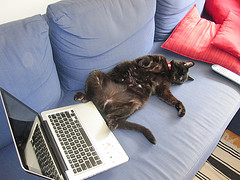Brits Try That Working From Home Thing Before Olympic Crowds Converge
Because no one can tell if you’re wearing actual pants or some kind of pajama legwear when sending a work email, mega-big British company O2 tried out the whole working from home thing at one office, with about 2,875 of its employees.
It’s not just about seeing if people like talking to their cats or taking a midday dance party break: The city of London is a bit nervous about all those crowds flooding public transportation during the upcoming Olympic games, and having people work from home could help alleviate that traffic, reports the Telegraph.
Workers from O2’s Slough office (the city where the original British The Office is set) were told to work from home one day so the company could study the benefits and potential cons.
According to what workers said, it seems the trial was a success. But come on — anyone who’s allowed to eat pizza in their underwear while on a conference call is going to report that everything went swimmingly. Meanwhile, 125 of their unlucky coworkers were deemed “mission critical” and stayed in the office.
Some of the findings: Staff saved a collective £9,000 (about $14,200 U.S.) in reduced commuting costs; 14% said they saw more of their families and 36% t said they were more productive than when at work; 1,000 hours usually spent commuting were spent working and workers reported 1,000 extra hours of sleep and relaxing.
The company saved as well, including a reduction in CO2 emissions, and 1,000 fewer cars on the campus. Electricity and water use declined 12% and 53% respectively. However, gas use rose in the building, as there were fewer warm viable worker bee bodies to contribute heat.
No word on how many employees refused to shower or change out of their pajamas until it was time to head out for the evening and see actual people.
Working from home ‘more productive’ [Telegraph]
Want more consumer news? Visit our parent organization, Consumer Reports, for the latest on scams, recalls, and other consumer issues.


